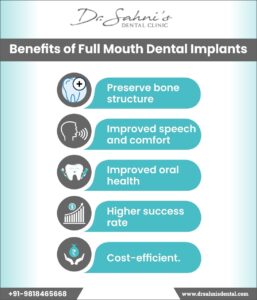In recent times, many of us suffer dental problems like tooth decay due to number of reasons. In the past few decades, people with a missing tooth were prescribed to get bridges and dentures. But, with modern advancements in dentistry, people can now get full mouth dental implants to repair a decayed or broken tooth due to periodontal gum disease or an injury. Dental implants are fixtures that are designed to compensate for the lost tooth and function like your natural tooth. That means they make eating and chewing food easier and also improve your smile, thus protecting you from social embarrassment. Dental implants are highly durable and provide better and long-term results than conventional bridges and fixtures.
Table of Contents
- What are full mouth dental implants?
- Types of Full Mouth Dental Implant
- Full mouth dental implant procedure
- Cost of Full mouth dental Implants
Takeaway
- What are full mouth dental implants?
Getting full mouth dental implants, also known as full-arch dental implants can help you smile and are designed to solve discomfort while eating, chewing, or speaking in case of decayed or missing teeth. Full arch dental implants are made in a way to work like your natural teeth and focus on replacing all or most decayed teeth instead of replacing an individual tooth. Full mouth dental implants have high success rates and are highly durable; these may last a lifetime. Before undergoing a dental implant, your dentist would thoroughly examine the condition of your teeth and buccal cavity to customize the best treatment plan for you.
- What are different types of full mouth dental implants?
Full arch dental implants are available in two main types- all on 4 and all on 6. Let’s understand them in detail.
All-on-4 dental implants-
The all-on-4 dental implant is a dental restoration technique that aims at replacing the set of upper or lower teeth with just 4 implants. These four implants act as the support for the complete set of newly implanted teeth. In this procedure, a dental surgeon works to tilt the posterior implants at 45 degrees towards the back of the mouth and place them into the anterior maxilla- a part of the jaw with high bone density. Unlike other implant methods, all-on-4 dental implants don’t require the same bone mineral density in the jaw to secure the implant in place.
All-on- 6 dental implants
The all-on-6 dental implant makes an ideal choice for candidates having enough bone structure in the jaw. This procedure includes creating a permanent prosthesis by using six dental implants that act as an anchor for dental fixtures or overdenture.
All-on-8 dental implants
The all-on-8 dental implant is a dental restoration procedure in which 8 dental implants are attached to be used as an anchor for a fixed dental bridge. The all-on-8 dental implant is generally performed on patients whose over 80% of teeth are decayed or lost. The uniform distribution of force during eating food or chewing ensures that there is less stress on the implant induced by chewing than in the case of all-on-4 dental implants. Since the space between the all-on-8 implants is very less, a dental bridge is made of materials such as porcelain or zirconia to look natural.

- Full mouth dental implant procedure: step-by-step
Full mouth dental implant is performed under local anesthetics and you will be injected with numbing injections and anesthetics to reduce the sensations of pain and discomfort. The full-mouth dental implant procedure involves the following steps
Step1- In the first step, a dentist would open up the gums into two flaps using a scalpel to get a clear view of the jaw bone.
Step2- Thereafter, a hole will be drilled into the jawbone using a hand-held drilling machine to place and secure the dental implant. This process is repeated for all implants to be placed. In some cases, a temporary crown or cap is placed over the implant to protect it against saliva or the oral environment.
Step 3– Then, the dentist would work to trim, shape, and reposition two gum flaps over the jawbone and around the dental implant’s healing cap. You may get seven to ten sutures in the gum to hold the tissue in place and these sutures can be removed after 7–10 days of the procedure. During the initial 2-6 months, the implants and bone would make a bond to form anchors for your new teeth.
Step 4-Now, it’s time to uncover your dental implants and remove temporary crowns or healing caps and attach the abutments.
Step 5– Your gums will be given some time to heal after this step.
Step 6-Finally, your dentist would work to fix full bridges or full dentures created to replace your natural teeth with abutments.
With the newer emerging medical technology, many surgeons are switching to dynamic navigation technology for dental implant over flap surgery. Dynamic navigation technology enables dental surgeons to visualize site development in real time while implant drills are in progress. The main advantage of dynamic navigation technology is that it does not involve surgical cuts to raise the gum flap and sutures to reattach the skin over the gum, which reduces pain and discomfort to the patient.
- How much does a full dental implant cost?
The cost of a full mouth dental implant may vary for each patient depending on the number of teeth to be replaced, severity of tooth decay, gum health, age, and medical history. On average, the cost of the full-mouth dental implant ranges anywhere from INR 25000 to 45000.
Takeaway
Looking for the best dental clinics in Delhi? At Sahni dental clinic, our team of expert doctors is committed to delivering the best dental treatments, including full mouth dental implants to our patients with precision and great care. Our clinic has advanced technology and we adhere to strict sanitization protocols for your safety.
